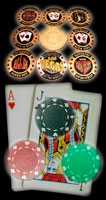Book Players
Players who tend to play strictly according the recommendations of their favorite poker book tend to self-identify.
They talk about playable hands and correct play.
They tend to talk about hand groups a lot and use phrases such as pot odds, implied odds, or dominated hands at the table.
They also tend to categorize other players based on how their pre-flop play matches their favorite hand groups.
In loose games they tend to overplay pairs on the flop and underplay draws.
These players tend to read about the game a lot. They subscribe to Card Player and Poker Digest magazines.
They tend to devote a lot of energy to memorizing the things they read and not much energy to just thinking about the game.
They believe they think about the game a lot, but they really don’t.
They are not good players, but they tend to play fairly tight and are aggressive in passive games.
Because of this they do tend to be consistent but small winners in a typical passive game.
Book players tend to select their starting hands from a list, rather than according to the game, he tends to become a fish.
If it’s a double bet on the end game (3/6/12 or 10/20/40), he approaches the characteristics of a huge fish.
When he does think about the poker game, he tends to think in terms of a contest between a made hand and a draw-sort of a fuzzy two-player game theory perspective.
That’s a perspective that doesn’t work well in a very loose or loose-aggressive game.
Also, reverse tells tend to work well against this kind of player-especially if you have been labeled a maniac because you were seen as you limp reraise six callers from UTG with A ![]() 5
5 ![]() .
.
Pick the Right Table / Picking a Seat / Theories of Poker / Betting Theory: The Odds
A Theory of Starting Hand Value
A Theory of Flop Play: Counting Outs and Evaluating Draws
The Dynamics of Game Conditions / Table Image / Player Stereotypes
Women and Poker / Spread-Limit Games / Double Bet on the End Games / Kill Games
Short-handed Games / Tournaments / No-limit and Pot-Limit Poker



